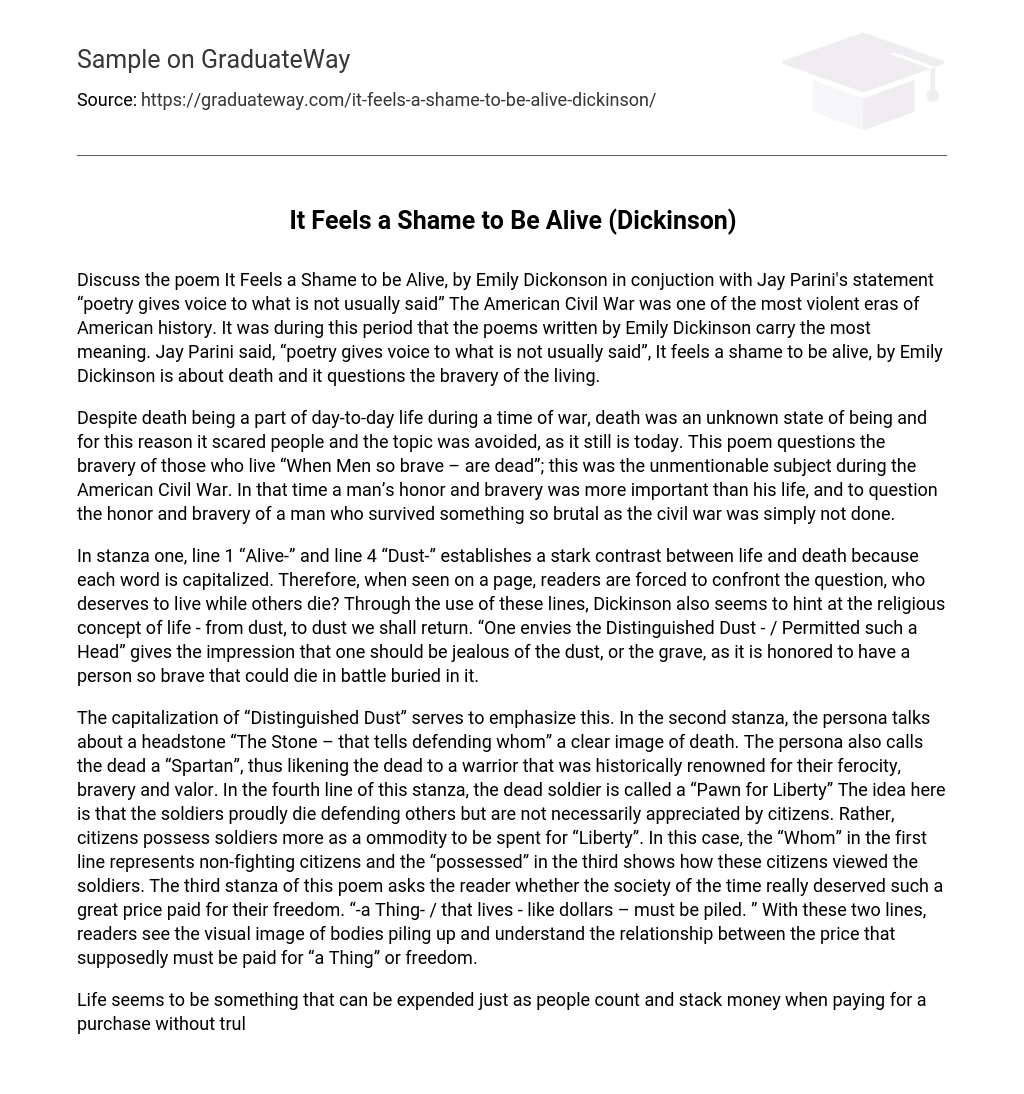Discuss the poem It Feels a Shame to be Alive, by Emily Dickonson in conjuction with Jay Parini’s statement “poetry gives voice to what is not usually said” The American Civil War was one of the most violent eras of American history. It was during this period that the poems written by Emily Dickinson carry the most meaning. Jay Parini said, “poetry gives voice to what is not usually said”, It feels a shame to be alive, by Emily Dickinson is about death and it questions the bravery of the living.
Despite death being a part of day-to-day life during a time of war, death was an unknown state of being and for this reason it scared people and the topic was avoided, as it still is today. This poem questions the bravery of those who live “When Men so brave – are dead”; this was the unmentionable subject during the American Civil War. In that time a man’s honor and bravery was more important than his life, and to question the honor and bravery of a man who survived something so brutal as the civil war was simply not done.
In stanza one, line 1 “Alive-” and line 4 “Dust-” establishes a stark contrast between life and death because each word is capitalized. Therefore, when seen on a page, readers are forced to confront the question, who deserves to live while others die? Through the use of these lines, Dickinson also seems to hint at the religious concept of life – from dust, to dust we shall return. “One envies the Distinguished Dust – / Permitted such a Head” gives the impression that one should be jealous of the dust, or the grave, as it is honored to have a person so brave that could die in battle buried in it.
The capitalization of “Distinguished Dust” serves to emphasize this. In the second stanza, the persona talks about a headstone “The Stone – that tells defending whom” a clear image of death. The persona also calls the dead a “Spartan”, thus likening the dead to a warrior that was historically renowned for their ferocity, bravery and valor. In the fourth line of this stanza, the dead soldier is called a “Pawn for Liberty” The idea here is that the soldiers proudly die defending others but are not necessarily appreciated by citizens. Rather, citizens possess soldiers more as a ommodity to be spent for “Liberty”. In this case, the “Whom” in the first line represents non-fighting citizens and the “possessed” in the third shows how these citizens viewed the soldiers. The third stanza of this poem asks the reader whether the society of the time really deserved such a great price paid for their freedom. “-a Thing- / that lives – like dollars – must be piled. ” With these two lines, readers see the visual image of bodies piling up and understand the relationship between the price that supposedly must be paid for “a Thing” or freedom.
Life seems to be something that can be expended just as people count and stack money when paying for a purchase without truly realizing its worth. Comparing life to dollars poses the question of whether all lives are of equal worth, or if some lives are worth more than others. In the fourth stanza, Dickinson asks whether the lives of those who survive worth all the lives sacrificed in battle, similar to her message in the third stanza. Are our lives, “we that wait”, worthy of something so beautiful as someone’s life, the “Enormous Pearl” being destroyed in something so brutal as battle.
The line “In Battle’s – horrid bowl” gives the image of a brutal and bloody turmoil that, like the curved edges of a bowl, is inescapable. The spelling of “reknown” is the only time Emily uses this archaic spelling in her entire suite of poetry; it playfully reworks the concept of ‘renowned’ dead soldiers (i. e. , renowned in glory for the supreme sacrifice for a nation) and instead limits the responder to “re-knowing” the dead, recognizing their act but outside contexts of glory, honor, or sadness.
It is a simple fact of knowledge that death is a product of the warmongering value set of her contextual northeastern America violently pursuing manifest destiny. The stanza is about subtly reworking the responder’s own interpretations of the accepted social view of soldiers and their sacrifice; and reminding the reader that contextually the Civil War was morally bankrupt in many regards, fought not on lines of emancipation but instead on a purely industrial sense. And furthermore that the sacrifice of the soldiers life was the closest thing to and pure or decent act in this onflict, that “Those unsustained – Saviors – / Present Divinity” Dickinson’s poem, it feels a shame to be alive forces the reader to think about death and the sacrifices of those involved in violent conflict. She forces the reader to question the bravery of those who live and puts forward the idea that heroes of war are not necessarily heroes at all, just the lucky ones. Perhaps this question could also be applied to many recent and current conflicts, are they heroes, or are they simply lucky. Word Count: 823





